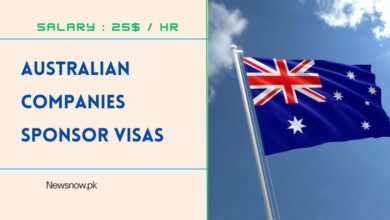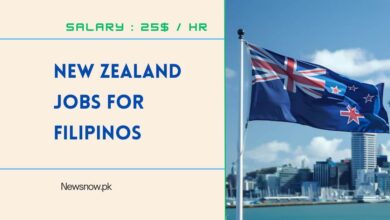Healthcare Jobs in Germany 2026 – Work Visa Opportunities
Are you a healthcare professional looking to work and live in Germany? Here’s your opportunity to hear directly from German government experts in a free online webinar, tailored for international jobseekers in the healthcare sector.
Germany continues to face a critical shortage of healthcare professionals, making an ideal time for international medical workers to pursue rewarding careers in the country. With structured pathways for work visa sponsorship, official recognition of foreign qualifications, and government-backed support through agencies like ZAV and EURES, skilled healthcare workers from around the world have a clear and legal route to employment in Germany.
Whether you’re a nurse, caregiver, or medical technician, this guide will walk you through the top healthcare job opportunities, visa options, and benefits of working in one of Europe’s most advanced healthcare systems.
Check Also: Visa Sponsorship Nanny Jobs in Germany – Apply Now
Job Details:
- Title: Working in the Health Sector in Germany
- Language: English
- Format: Livestream (Online)
Register directly on the official platform:
Webinar Registration Link
Why Germany Needs Healthcare Workers?
Germany is currently experiencing a severe shortage of skilled healthcare professionals. According to the Federal Employment Agency, there is a growing demand for nurses, caregivers, and allied health workers to meet the needs of an aging population and an expanding healthcare system.
This shortage has created real, legal work opportunities for qualified international candidates — particularly in roles such as:
- Registered Nurses (General and Geriatric Care)
- Certified Caregivers
- Medical and Radiology Technicians
- Physiotherapists and Occupational Therapists
- Laboratory Assistants
Webinar working:
During the session, official representatives from ZAV will explain:
- Current job market trends in Germany’s healthcare sector
- Step-by-step process for foreign qualification recognition
- Visa and residence permit options for non-EU applicants
- Tips for writing CVs and job applications according to German standards
- Information about salaries, work culture, and social security
- Real job openings and how to apply through verified platforms like EURES
Eligible Candidates:
This event is ideal for:
- International healthcare professionals seeking EU jobs
- Recent medical or nursing graduates aiming for Germany
- Skilled workers planning to migrate without intermediaries
- Students preparing for healthcare careers abroad
You don’t need an agent — this event will guide you through official and safe pathways to work in Germany.
How to Apply for Healthcare Jobs in Germany 2026?
Once you’ve attended the webinar, you’ll be equipped with all the tools you need to begin applying.
Start here with the official EU job portal:
EURES – Working in Germany’s Health Sector
You’ll find open roles, employer contact details, and resources for job seekers from outside the EU.
Benefits:
- High Demand for Skilled Workers
Germany is experiencing a significant shortage of healthcare professionals, offering stable and long-term career prospects. - Attractive Salaries
Competitive wages with regular salary increases based on experience, qualifications, and region. - Work Visa Sponsorship Available
Many employers offer direct sponsorship for the Skilled Worker Visa or EU Blue Card. - Official Government Support
Programs supported by the Federal Employment Agency (ZAV) ensure transparent and safe migration pathways. - Recognition of Foreign Qualifications
Structured systems are in place to help you get your medical degrees and certifications officially recognized. - Pathway to Permanent Residency
After a few years of employment, skilled workers may qualify for permanent residence or German citizenship. - Family Reunification Options
Eligible healthcare workers can bring their spouse and children under Germany’s family reunification rules. - Comprehensive Social Benefits
Access to health insurance, pension, unemployment benefits, and paid leave under Germany’s welfare system. - Opportunity for Career Growth
Access to continuing education, specialization programs, and advanced degrees. - Safe and High-Quality Work Environment
Regulated working hours, patient safety standards, and professional protection are enforced by law. - Live and Work in the EU
Legal residency in Germany may allow travel or future work within other EU countries.
ZAV Details:
ZAV (Zentrale Auslands- und Fachvermittlung) is the international division of Germany’s Federal Employment Agency (Bundesagentur für Arbeit). It helps skilled international professionals find legal employment in Germany with reputable employers — with no agency fees or hidden costs.
Don’t miss this opportunity to gain official guidance, verified information, and a clear roadmap to start your healthcare career in Germany.
Frequently Asked Questions:
Is it possible to migrate without using agents?
Yes. Germany offers transparent and agent-free pathways. Government portals like ZAV, EURES, and Make it in Germany allow direct job applications and visa guidance.
Is German language proficiency mandatory to work in healthcare?
Yes. Most healthcare roles require at least a B1–B2 level in German, depending on the profession and employer. Some states require B2 certification for nurses and direct patient care roles.
Can international professionals apply for healthcare jobs in Germany?
Yes. Germany actively recruits non-EU healthcare professionals to fill skill gaps. Applicants must meet specific qualification recognition and language requirements to be eligible for work and residence permits.




